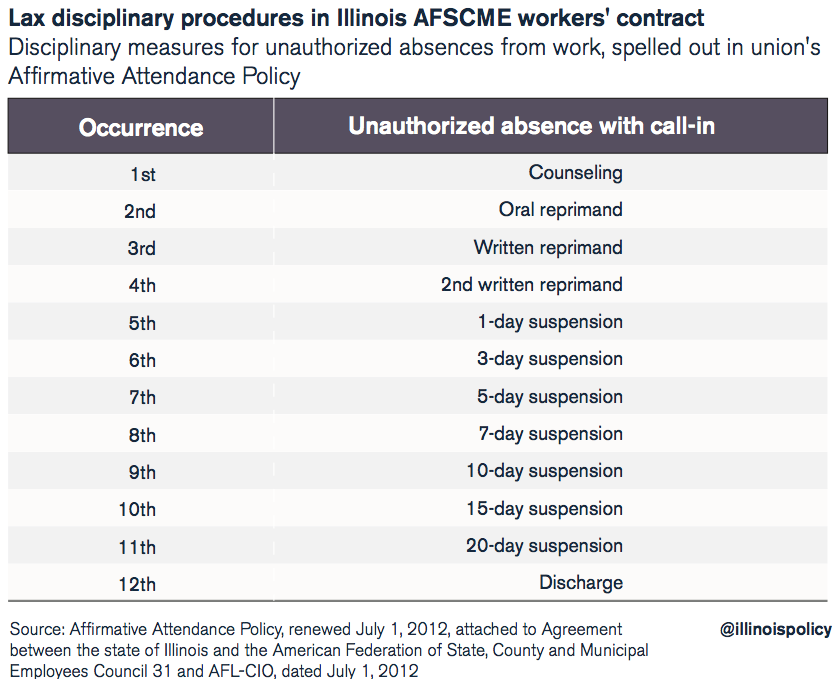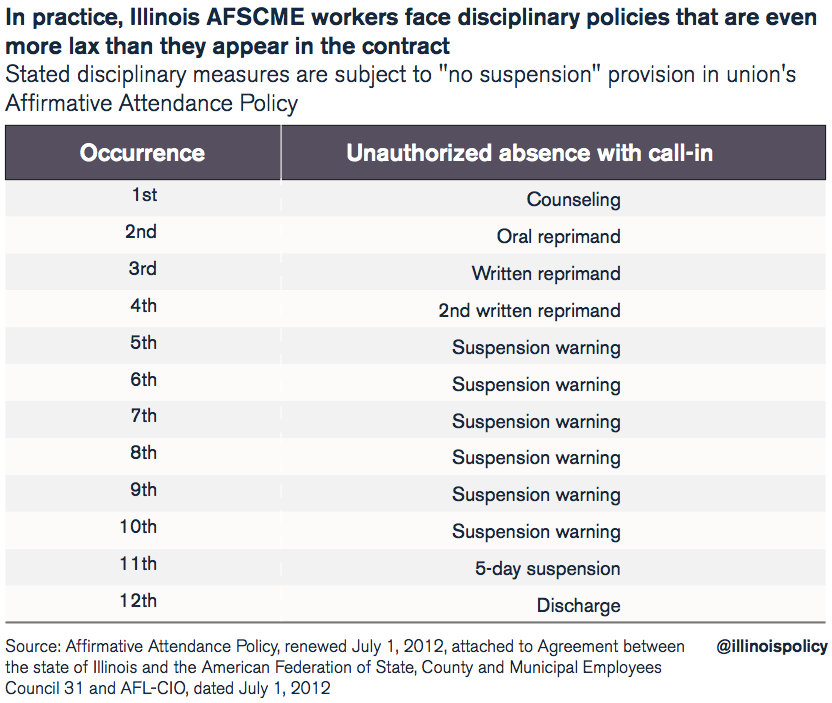AFSCME contract lets Illinois state workers miss 10 days without discipline
AFSCME union members receive generous salaries and benefits from their state contract, yet union bosses are pushing to enshrine their power in the Illinois Constitution – something no other state has been willing to do.
Illinois state finances are struggling, but its union employees continue being some of the best paid in the nation. One government union is doing especially well: the American Federation of State, County and Municipal Employees Council 31.
AFSCME’s salary and compensation outpace the private sector, yet union bosses are not satisfied and want to continue the favored status they gained through indicted former Illinois House Speaker Mike Madigan. They want voters to approve Amendment 1, a change to the Illinois Constitution being sold as workers’ rights, but in reality a way to permanently enshrine those Madigan favors and union powers in the Illinois Constitution.
Generous union contracts have contributed to driving Illinois property taxes to No. 2 nationally, the state and local tax burden to No. 1 and state finances to No. 50. And yet union bosses still want permanent power to continue the cycle.
AFSCME Council 31 represents approximately 35,000 state workers in Illinois under single contract. From 1998 to 2019, average state worker compensation grew 60% faster than Illinois’ average private sector wages.
Private sector workers are typically rewarded with raises based on merit. AFSCME workers are automatically granted increases in pay based on years of service and job classification. Their contract guarantees high salaries and protects state employees from most consequences for showing up late – or not showing up at all.
State employees can miss 10 unauthorized days of work and face no discipline
AFSCME bargained for lax attendance policies that are unheard of in the private sector.
The AFSCME contract calls for escalating suspensions if employees miss work for unauthorized reasons. If the worker at least calls in, disciplinary action would resemble this:
But AFSCME’s contract also includes an appendix changing the contract’s policy to allow workers to have 10 unauthorized absences from work without any discipline as long as they call in.
They’re suspended on the 11th offense. That suspension is just five days.
State workers are fired after missing 12 days of work in a two-year period. The count starts over if they stay under 12 for two years.
State employees can miss five consecutive days of work without calling in and face no discipline
State employees under the AFSCME contract can miss five consecutive work days without telling their bosses, and after that they only “might” be fired:
“Absence of an employee for five (5) consecutive work days without reporting to the Employer or the person designated by the Employer to receive such notification may be cause for discharge. The above provision shall not apply so long as the employee then notifies as soon as it is physically possible.”
In other words, the state isn’t required to fire an employee after they’ve missed five days without reporting in, and missing less than that isn’t necessarily disciplined, either. In fact, the contract appears to wipe the slate clean as long as the employee notifies the employer as soon as possible – even if that happens after the fact.
The state does not have to discipline employees who are repeatedly late to work
AFSCME’s contract provides “[t]here shall be no general policy of docking for late arrival” for many state workers.
An employee who is “repeatedly late may be docked until the problem has been resolved,” but there is no affirmative duty for the state to do so.
State workers get paid for doing union work on the job
Employees are allowed to do union activities during work hours and be paid by the state for that union work. This includes attending certain enumerated union meetings, activities and union steward training instead of completing assigned state work.
Despite generous contracts, union leaders want more
Yet these lax policies on the taxpayer’s dime aren’t enough for union bosses. They want permanent power, and are pursuing that by trying to get voters to place a radical amendment in the Illinois Constitution.
Amendment 1 would cement four new provisions into the constitution that no other state has. It would give unions a permanent right to collective bargaining over not just benefits, but potentially any topic they choose – a power the Chicago Teachers Union has tried to wield to pursue its social agenda on housing, immigration, “restorative justice,” wealth redistribution and defunding the police.
Union contracts would carry the weight of the constitution, empowering union leaders to negotiate contracts that could override more than 350 state laws. There would be no limit on what union leaders could demand, no limit on what government officials could promise, and no requirement that the government unit be able to pay for whatever generous benefits are in the contracts.
Come Nov. 8, voters have a choice: grant AFSCME Council 31 leadership the ability to override state law, or protect Illinois taxpayers from a future of continued tax hikes driven by union bosses and the politicians whose campaigns they fund.

